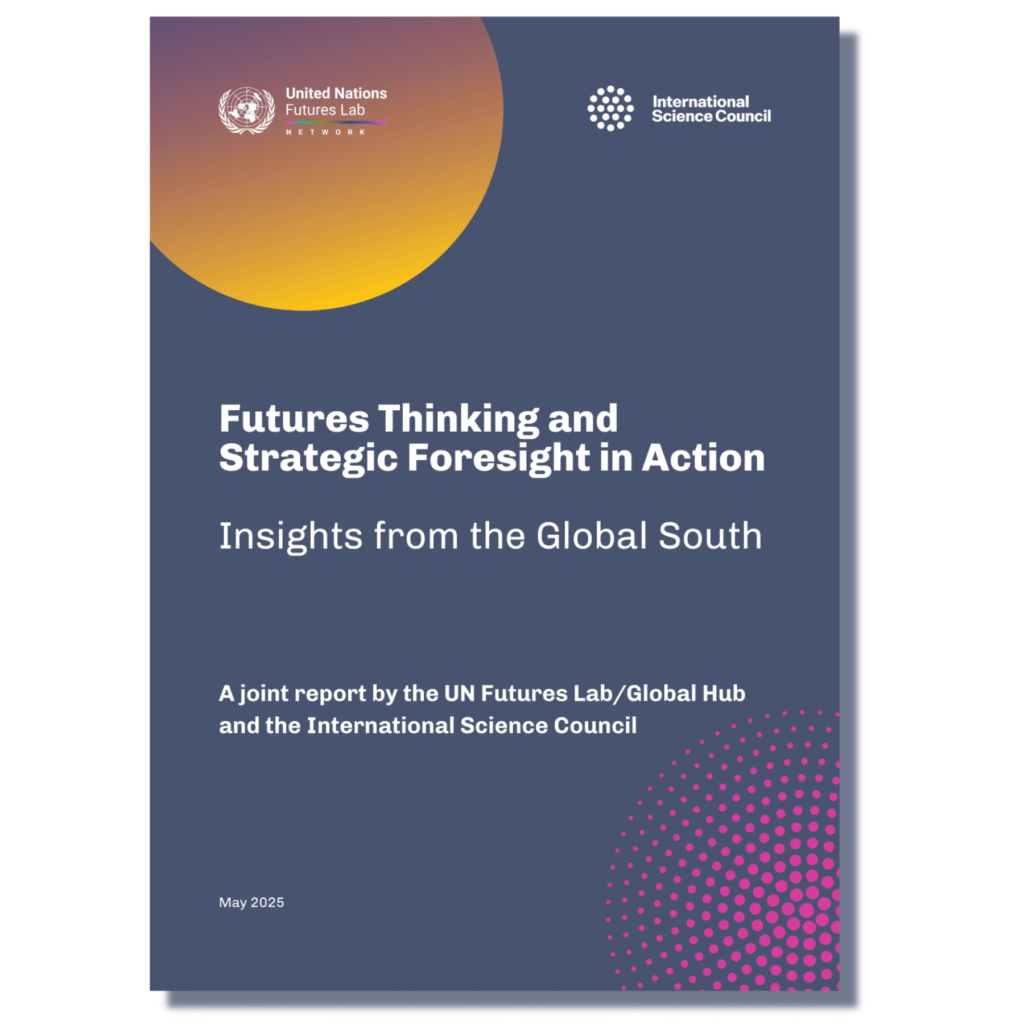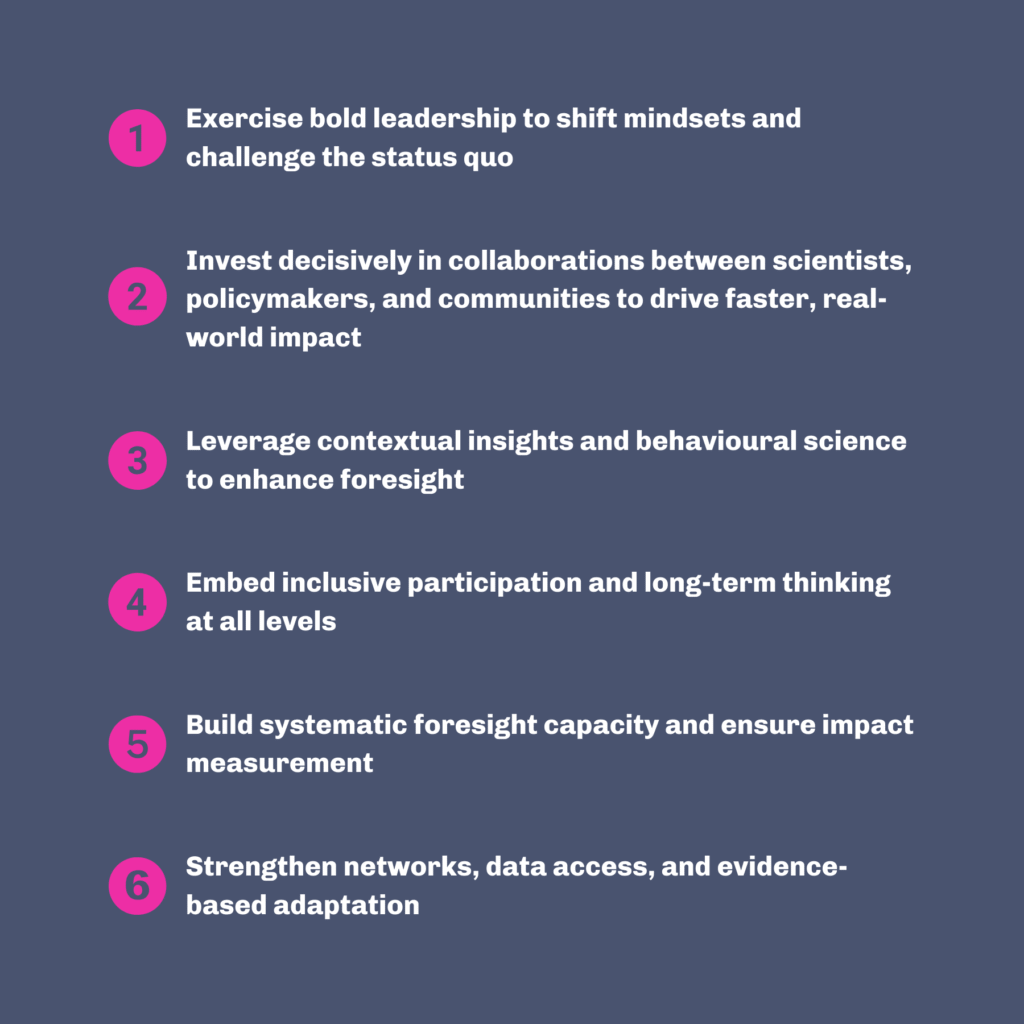[Report] Futures Thinking and Strategic Foresight in Action: Insights from the Global South



How is the Global South shaping the future of governance, innovation, and resilience in a long-term, anticipatory manner?
This joint report by the UN Futures Lab/Global Hub and the International Science Council (ISC) explores this question by highlighting how countries across the Global South are applying futures thinking and strategic foresight in real-world contexts – from food security and climate resilience to digital governance and social protection.
The UN Futures Lab/Global Hub and the ISC issued a call for case studies in March 2024 to learn from foresight approaches developed and used in the Global South in decision-making, planning, and action. Historically, examples from the Global North have predominantly appeared in futures thinking and strategic foresight discussions. However, the widespread application of futures and foresight in the Global South provides a rich opportunity to uncover valuable insights and learnings, bridging diverse perspectives, novel approaches, and methods across regions.
The selection of 14 case studies presented in this report reflect balance across geographies, themes, sectors, stakeholders, and foresight tools. The case studies illustrate a range of impacts, primarily through a typology of approaches by desired outcomes.
Background
The report emerged from a shared dedication between the UN Futures Lab/Global Hub and the International Science Council (ISC) to amplify voices and experiences of the Global South in the global foresight landscape. On 6 May 2025, the joint publication was launched at the 10th Multi-stakeholder Forum on Science, Technology and Innovation for the Sustainable Development Goals (STI Forum 2025).
Key highlights
- 14 diverse case studies, ranging from hyperlocal women’s participation in climate action in India to national policy design in Nigeria, from participatory digital futures in Africa to climate adaptation led by Indigenous communities in Bolivia
- 8 practical typologies of foresight impacts, from local and indigenous knowledge, sources, and practices to multistakeholder partnerships and collaboration, organizational development and policy innovation
- Key foresight tools and approaches applied across the case studies, including, horizon scanning, scenario development, Causal Layered Analysis (CLA), six pillars, and back casting
Six key recommendations for inclusive foresight
This report provokes more questions than answers. It is only one part of the equation, intended to motivate diverse discussions, dialogue, cross-cultural perspectives, and action in order to inspire debate, facilitate exchange, and ultimately contribute to helping drive a more forward-looking and anticipatory multilateral system that is fit for future generations.
Applying foresight in decision-making and policymaking is influenced by a range of key factors. While these are not specific to the Global South, the case studies highlight the importance of embedding these factors in design, implementation, and follow-up.
There is no one-size-fits-all approach to futures thinking and strategic foresight practices; nevertheless, six key recommendations resonate across the case studies featured in the report.

Thought starters
- What does a foresight-informed Heat Action Plan look like when led by women using traditional knowledge and intergenerational engagement? (See case study in India)
- Can ancestral agricultural practices and foresight scenarios provide answers to modern climate threats? (See case study in Bolivia)
- How might indigenous-owned data survey and scenarios shape 50-year plans for education, housing and health? (See case study in New Zealand)
- What role can foresight tools have in imagining positive futures for the digital transformation? (See case study in Kenya, Nigeria, Rwanda, Tunisia, and Zimbabwe)
“Our spotlight on the Global South is intentional. Although this region possesses rich, locally developed foresight traditions and proven methodologies, its perspectives have too often been sidelined in global dialogues. … We encourage policymakers, stakeholders from all fields, and scientists to reflect upon these short stories and engage with us on how we can enhance the diversity of foresight approaches and the impact of foresight on decision- and change-making.”
Ayaka Suzuki, Director, Strategic Planning and Monitoring, Executive Office of the Secretary-General, United Nations
Salvatore Aricò, Chief Executive Officer, International Science Council